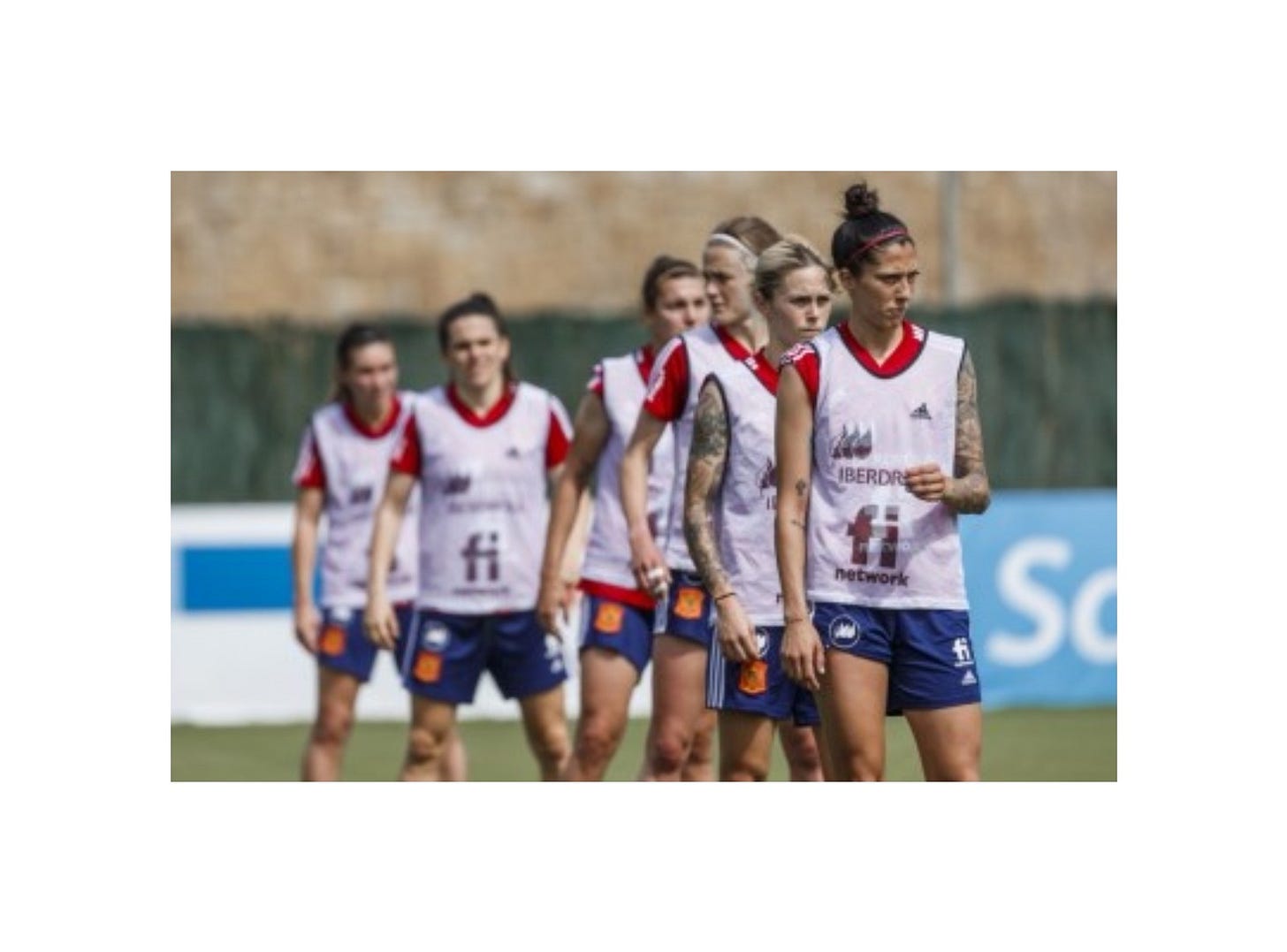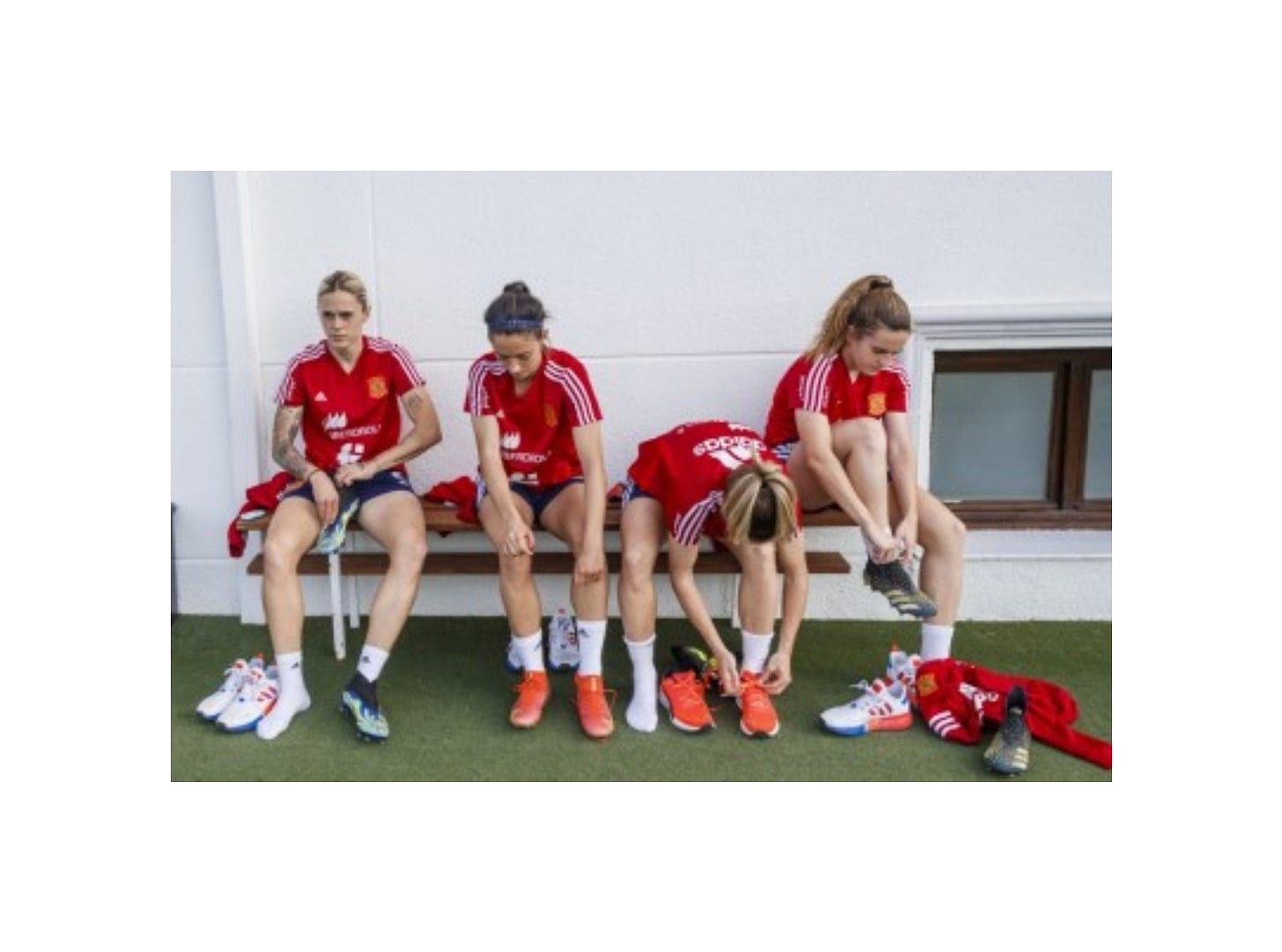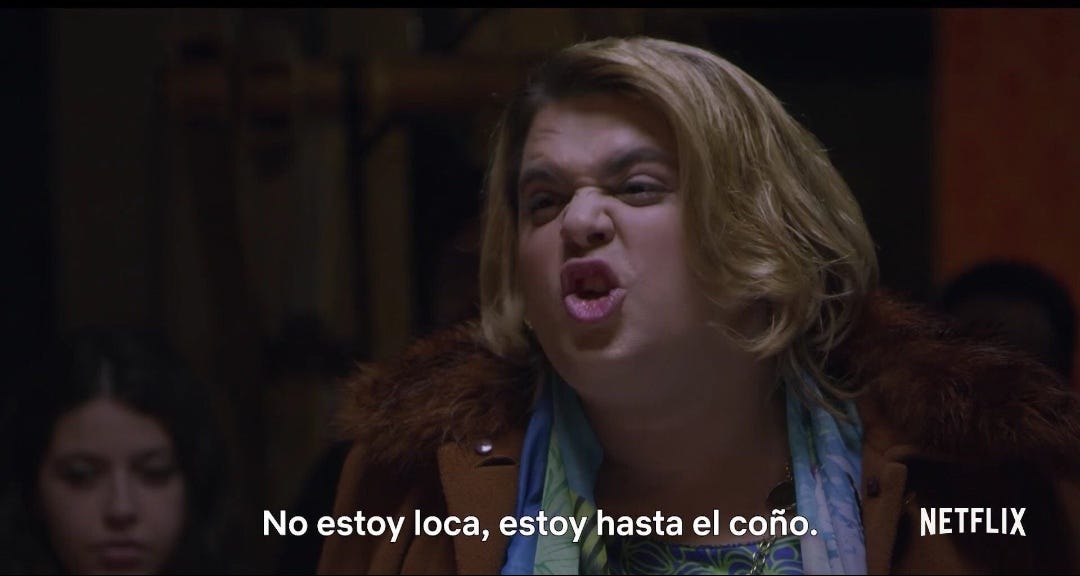Women’s football having to fight for what they deserve is nothing new, and Spanish footballers taking a step back from the national team is just the latest in a long row of female footballers standing their ground in the patriarchal world of football. The worrying thing is that we recently went through this with the 🇪🇸 WNT, and we’re back here again.
Things have gone from bad to worse in Spain, where the situation was already quite tense as concerns had been raised about Jorge Vilda, the Spanish women’s National Team coach, in regards to his suitability as coach of the team after a disappointing exit from the quarterfinals of the Euros in the summer. News broke on Thursday night that 15 players from the Spanish WNT had all separately sent the same email to RFEF, the Spanish Football Federation, on the night, where they told the federation that they were concerned for their emotional and mental health and were not going to answer any further call-ups for the national team until the situation changed with Vilda. In response, the federation publicly released a statement where they addressed the communication in a very contentious manner, saying things like:
“The RFEF will not allow the players to question the continuity of the coach, as taking those decisions are not part of their role” and “the players who have presented their resignation will only return in the future if they admit their error and apologise”
the list of players who sent an email, and the one’s who did not. It’s said that Irene Paredes, who’s a co-captain of the team and who brought up the issues a few weeks ago, did not sign it simply because she didn’t want to put herself in the firing line again after receiving a lot of critique after speaking up last time, and Alexia is long-term injured and therefore not available for selection at this time anyways. Of course Real Madrid reportedly advised their players to stay silent …
The players involved (+Alexia) published a public statement on Friday evening, where they called the RFEF out for publicly addressing an issue pertaining to their health (a private matter which should obviously under no circumstances be made public like that). Furthermore, the statement reads; “in no case have we RENOUNCED the Spanish Football National Team, like the official RFEF statement had mentioned.”
“Does it even occur to anyone that eight month before the World Cup, a group of PLAYERS OF THE HIGHEST LEVEL, which is what we consider ourselves to be, would make such a decision, as it has been published, on a impulse or as a shakedown?” and “By asking to not be called up by the National Team, we penalise our professional career, our economy and of course continuing to build something important for Women’s football. Because it has taken years of hard work from a lot of people to get to where we are today. Yet there are still many things to improve upon as it has been demonstrated recently.” (translated version found here)
There have been some really disturbing accounts of Vilda and his controlling tendencies reported, according to Mundo Deportivo he used to force the players to sleep with their doors open [when at National Team camps] and checking in their bags to see what they bought and asking who they went for coffee with. Out-width his behaviour off the pitch, he has not managed to do a whole lot on the pitch during his seven-year-reign. The reports suggest that the players do no longer believe in the manager or his methods, and that the team needs a change that is a step up, in order to get something from the World Cup (which is eight months out). Vilda had some early success with the younger female national teams but beyond that he does not have a lot of experience, he was only 34 years old when he was appointed manager of the first team.
We’ve been here before - with the Spanish WNT quite recently. The coach in charge before Vilda, Nacho Quereda, coached the team for 27 YEARS. Yes, you read that correctly. 27 years in charge of the team, and during his reign the team accomplished very little - he only managed to qualify the team for two Euros and one World Cup, yet he was allowed to stick around, and it was only when the team bowed out in the early stages of the 2015 World Cup and the team demanded his resignation that something changed. In 2021, a documentary called Romper el silencio: La lucha de las futbolistas de la selección (Breaking the silence: the fight of the national team players) was released, featuring accounts of Quereda’s decades long abusive treatment by the likes of Vicky Losada, Vero Boquete, and Natalia Pablos. The accounts reveal a manager that was patronising and controlling. Find the documentary (with English subtitles) on Youtube.
The feminine urge to stand up to the patriarchal federations
There’s a sense of history repeating itself, over and over and over again, as the documentary depicts two generations of female footballers in Spain writing letters to the federation, asking for Quereda to be dismissed, and it was only by involving the media that enough pressure was applied for things to change the second time around (and maybe the fact that it had been 27 YEARS). There was collateral damage, a price to pay for some of the older players who were spearheading it and were not really called up for the national team again after that, and the working theory is say that Vilda did not want to keep dissidents around. So, how to actually break the spell?
Even though there seems to be a high frequency of these specific issues in Spain, it’s not exclusive to any one culture or place, and luckily the feminine urge to stand up to it is STRONG. These Spanish players are standing on the shoulders of giants, just the latest in a long row of players who have made a point of speaking up for themselves amidst poor treatment, at great personal cost - Ada Hegerberg with Norway, Amandine Henry with France, Estefania Bandini with Argentina, the Danish women’s national team … players who at one point or another were ousted and/or removed themselves from the national team because they knew they deserved better and they dared to ask for it. In some cases things improved, but that doesn’t equal a sufficient standard. The US women’s national team and their decade-long fight for Equal Pay is another example, showing how even being the best women’s football team in the world does not lend enough sway to convince people that don’t want to be convinced.
The federation is the issue
Although it is first and foremost Vilda that players and fans want removed, it’s important to note that nothing will really change unless the federation changes. Luis Rubiales, the president of RFEF, and the other members of the federation seem hellbent on dragging this issue as far as they can, willing to burn down any and all progress made. This includes Ana Álvarez, the director of women’s football, who said “Jorge Vilda is inquestionable, we believe in the project and his day-to-day work.” The situation is complicated further by the fact that Vilda’s father, Angel Vilda, used to be the head of the women’s football department at the RFEF (because, of course!), making the manager’s dismissal even less likely.
What’s becoming evident throughout this situation is that the federation are not even interested to pretend that they care about the women’s section. In a patriarchal world (that women can also be part of upholding, as they are made to believe they gain something by proximity to power), it’s not in their interest to have women flourish, which has been very clear by their actions, or lack thereof. They seem to be ready to abandon any and all potential hope that Spain has of doing well in Australia and New Zealand in the summer - and after watching that documentary, I’m not surprised.
We’re looking at deep-rooted structural and systematic issues that have been given over a century to take root in the football world, one of the most ingrained scenes for machismo and misogyny. The pillars of the patriarchy are always going to support and hold up these mediocre men, always going to extend a helping hand to a ‘bro’, in order to ensure the continuation of a system that greatly benefits them. It’s not easy to dismantle such institutionalised discrimination and going up against the people who hold the power, but we need to start by seeing these things for what they really are - in many cases just acts of desperation to stay on top.
To ensure that the progress that has been made keeps going, we need to provide:
safe spaces for people to come forward, and listen to them.
tell and share the stories!
ability to make it accessible (thanks to Twitter user @StatsandEdits who helped translate some English subtitles on the Romper el Silencio documentary and tweeted about it).
solidarity and support.
Where to go from here?
Spain are scheduled to play Sweden on the 7th October, and the USWNT on the 11th October. There has been an outpouring of vocal and public support from US players like Megan Rapinoe, Alex Morgan and Becky Sauerbrunn, and some people have been musing about whether the US should refuse to play as a show of solidarity with the Spanish team, or whether it’s better to have the game go ahead and keep the conversation around the issue going. What’s going to happen remains to be seen, but all the kudos to the players on the Spanish national team who spoke out about this, knowing very well what it could come to cost them ❤️
Good accounts to follow:
@RELEVO - Spanish media, updates on the situation as it unfolds
@FRAWNTS - great critical analysis
@FORZAWOZO - updates on instagram
Paquita Salas sums up the mood: “I’m not crazy, I’m fucking tired”








